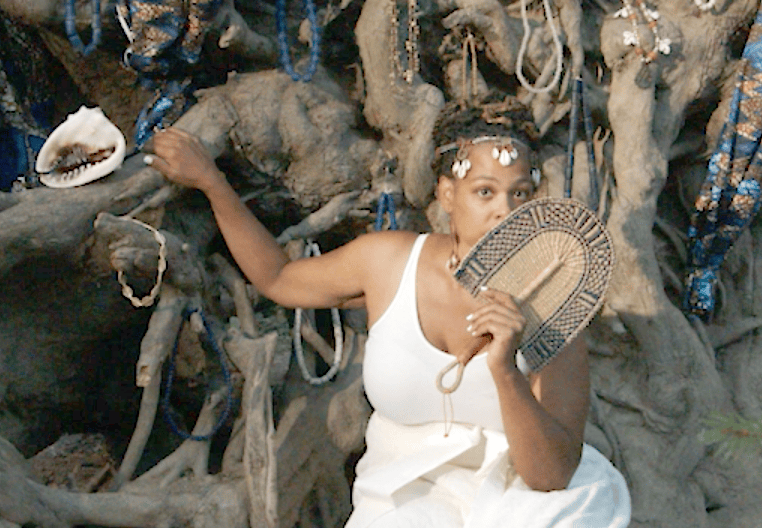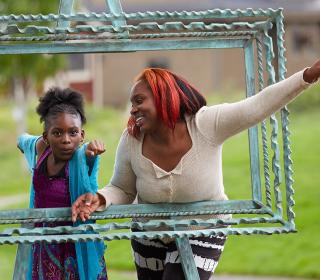As someone whose work centers around giving voice to social issues, human relationships, and celebrating the diversity and sexuality of people of color, Monique Franklin, aka Verbal Oasis, was our ideal performing artist for our 2022 Virtual Inspire Luncheon.

Much of Monique's work features a celebration of life in spite of its many hardships, which perfectly fit this year's Luncheon theme: Rise & Thrive. We sat down with Monique to discuss what "rising and thriving" means to her, and how she uses her art to connect with her community and inspire others to embark on a journey of self-healing.
What does the phrase “rise and thrive” mean to you?
Rise and thrive is what every human being should have an opportunity to do in their lifetime, with no barriers to their life purpose. We all have an amazing gift to give to the world, and we encounter barriers some of us can overcome and some of us cannot. When we can’t overcome them, the world misses out on the light those people had to offer.
Can you share how YWCA contributed to or impacted your path as an artist?
I was invited to a YWCA program called Dress for Success, but a specific program “Queen for a Day”. At that event, they did a makeover and they gave us clothing for the employment that we were seeking to get and have, and then they did a photoshoot.
As an artist, it was the first photoshoot I had ever done, and they are pictures that I still feature on our website. It was helpful on many levels; some of the clothes that I got were clothes that I wore to some of my first poetry gigs, and definitely were not investments I could have made at that time as a single mom. It was really validating to have an organization like YWCA validate my profession as an artist.
What made you want to become an artist?
We’re all artists, just like I think we’re all scientists. I don’t think we can exist without being curious and creative in a day, and I think those are the roots of arts and sciences. I have a Computer Science degree from the University of Washington, I spent a lot of time there doing programming, and to me, programming is nothing more than creation. You’re creating something that doesn’t exist – whether that is to solve a problem or create entertainment.

Poetry was a way for me to engage with the world and try to make sense of it and process it. It oftentimes was a way to drain the poisons of the world from me. “I’ve experienced this thing, I’m gonna put it on the page, and then I can have some distance from it, and it’s not something I’ve wrestled with in my subconscious.” For me, art is very therapeutic as well.
What drew you to poetry specifically?
What I love about poetry is that you can actually change someone’s whole trajectory in three minutes – in less than three minutes. Someone can learn something that is just like an “Aha!” moment. One of the things that I think is so powerful about human interaction is how little of it you have to have with certain people, and it can make a lasting change in your life.
There’s something very human about being able to share someone else’s experience in three minutes or five minutes that there really isn’t necessarily another medium for. I really feel honored to be able to do that, to tell my stories, but also to advance and study and to tell other's stories and to tell stories of artists that inspired me, I just find poetry to be a tremendous medium for that.
How does art impact the community?
[Art] definitely is a very community-building thing. I’ve used my art to help create healing within my community, to create dialogue within my community. I mean, it’s great to make art for yourself, but we don’t live in a vacuum. A lot of the time, the art we’re making is about the interactions we have with other people. It’s almost implied that the community is there – most people don’t make art in isolation. Whether your community is who you’re writing about, or your community is who’s listening, or your community is who’s being impacted by what you’ve said, community is definitely a necessary part.
What message or advice would you give to people who are trying to transition from surviving to thriving?
My way of being able to find thriving has always been in building communities, building relationships with people and being able to learn from others, being open to learning, and believing that I can do it at the end of the day. Sometimes hardships help us to learn something valuable about ourselves that we’ll never forget, and helps us to achieve our next level.

Find joy, truly, in every breath if you can find that. Find true friendship and community to help you get through, believe in yourself and invest in yourself. Whenever I’ve invested in myself, whether that’s in education or tools that I need for my business, I’ve always been able to grow and learn in those environments. So don’t be afraid to invest in yourself.
Even if you take small steps toward what you want, you’re still heading in the right direction. Do not discount the distance you can travel with small steps.
We thank Monique Franklin for sharing her words and wisdom with us. Learn more about Monique and her work as Verbal Oasis on her website.
Stay updated with YWCA by signing up for our monthly newsletter, or make a donation to support the women and families in our community.
Ana Rodriguez-Knutsen is the Content Specialist for YWCA's Marketing & Editorial team. From fiction writing to advocacy, Ana works with an intersectional mindset to uplift and amplify the voices of underrepresented communities.
We share the stories of our program participants, programs, and staff, as well as news about the agency and what’s happening in our King and Snohomish community.


